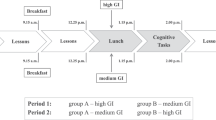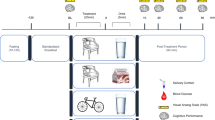Abstract
Background: Energy intake at breakfast affects the performance of creativity tests, memory recall and voluntary physical endurance in children before lunch, and food craving during the whole day.
Objective: To assess the adequacy of breakfast energy supply (BES) and energy expenditure (EE) in adolescents during a schoolday without or with 2 h of physical education lesson (PEL) in the morning.
Design: Sixty adolescents (four groups of 14–16 boys and girls aged 12–16 y) participated in a cross-sectional study. Activity patterns and EE were determined by whole-body calorimetry during 36 h and in free-living conditions during 5 days using both a diary and the validated heart rate recording method. BES was determined by weighing individual foods. The pyloric energy flow was assessed using a model of fractional stomach emptying.
Results: BES averaged 24.9% (s.d.=6.1) of daily EE in the four groups of subjects. It covered the mean morning EE on a schoolday without PEL, but not in a schoolday with 2 h of PEL in any group. When PEL took place from 8–10 am the cumulative EE exceeded the cumulative pyloric energy flow after 105–150 min, that is during the PEL session, and the energy deficit increased until lunch. With a light breakfast (BES−1 s.d.) energy deficiency happened after 90 min.
Conclusion: The results stress the need for a heavy breakfast for children and adolescents on the days with PEL in the morning, and a carbohydrate rich snack at 10 am to improve attention, memory and willing participation in physical activities.
This is a preview of subscription content, access via your institution
Access options
Subscribe to this journal
Receive 12 print issues and online access
$259.00 per year
only $21.58 per issue
Buy this article
- Purchase on Springer Link
- Instant access to full article PDF
Prices may be subject to local taxes which are calculated during checkout


Similar content being viewed by others
References
Benton, D & Parker, PY (1998). Breakfast, blood glucose, and cognition. Am. J. Clin. Nutr., 67, 772–778.
Bernier, JJ, Adrian, J & Vidon, N (1988). Méthodes d'étude et modéles mathématiques de la vidange gastrique et du transit digestif des aliments. (Methods of study and mathematical models of gastric emptying and digestive transit of foods.). In ‘Les aliments dans le tube digestif’ (Foods in the digestive tract), ed. JJ Bernier, J Adrian & N Vidon Paris: Paris
Bitar, A, Fellmann, N, Vernet, J, Coudert, J & Vermorel, M (1999). Variations and determinants of energy expenditure as measured by whole-body indirect calorimetry during puberty and adolescence. Am. J. Clin. Nutr., 69, 1209–1216.
Boirie, Y, Dangin, M, Gachon, P, Vasson, MP, Maubois, JL & Beaufrère, B (1997). Slow and fast dietary protein differently modulate postprandial protein accretion. Proc. Natl. Acad. Sci., 94, 14930–14935.
De Castro, JM (1993). Age-related changes in spontaneous food intake and hunger in humans. Appetite, 21, 255–272.
Delargy, HJ, Burley, VJ, O'Sullivan, KR, Fletcher, RJ & Blundell, JE (1995). Effects of different soluble: insoluble fibre ratios at breakfast on 24-h pattern of dietary intake and satiety. Eur. J. Clin. Nutr., 49, 754–766.
Holt, SHA, Delargy, HJ, Lawton, CL & Blundell, JE (1996). The satiating effects of four isoenergetic breakfasts of different macronutrient content. Proc. Nutr. Soc. Australia, 51, 455–461.
Hubert, P, King, NA & Blundell, JE (1997). Uncoupling the effects of energy expenditure and energy intake; appetite response to short-term energy deficit induced by meal omission and exercice. Int. J. Obes. Relat. Metab. Disord., 21, S125
Kirk, TR, Burkill, S & Cursiter, M (1997). Dietary fat reduction achieved by increasing consumption of a starchy food-an intervention study. Eur. J. Clin. Nutr., 51, 455–461.
Leveritt, M, Abernethy, PJ, Barry, BK & Logan, PA (1999). Concurrent strength and endurance training. A review. Sports Med., 28, 413–427.
Macdiarmid, JI, Cade, J & Blundell, JE (1996). High and low fat consumers, their macronutrient intake and body mass index: further analysis of the National Diet and Nutrition Survey of British Adults. Eur. J. Clin. Nutr., 50, 505–512.
Martin, A (2001). Apports nutritionnels conseillés pour la population française. (Dietary recommended allowances for the French population.), Paris: Tec et Doc Lavoisier
Pollitt, E, Cueto, S & Jacoby, ER (1998). Fasting and cognition in well- and undernourished schoolchildren: a review of three experimental studies. Am. J. Clin. Nutr., 67, (Suppl) 779–784.
REGAL (1996). Table de composition, FFN-CIQUAL, Paris: Tec et Doc Lavoisier
Romijn, JA, Coyle, EF, Sidossis, LS, Gastaldelli, A, Horowitz, JF, Endert, E & Wolfe, RR (1993). Regulation of endogenous fat and carbohydrate metabolism in relation to exercise intensity and duration. Am. J. Physiol., 265, (Endocrinol. Metab. 28)E380–391.
SAS (1989). SAS/STAT*User's Guide, Version 6, 4th edn, Vol1, Cary, NC: SAS Institute Inc.
Southgate, PAA (1978). The Composition of Foods, Amsterdam: Elsevier
Vermorel, M, Vernet, J, Bitar, A, Fellmann, N & Coudert, J (2002). Daily energy expenditure, activity patterns, and energy costs of the various activities in French 12- to 16-year-old adolescents in free-living conditions. Eur. J. Clin. Nutr., 56, (to be corrected)
Wyong, DP, Abrahamsson, L, Järtelius, M & Fletcher, RJ (1997). An experimental study of the effects of energy intake at breakfast on the test performance of 10-year-old children at school. Int. J. Food Sci. Nutr., 48, 5–12.
Acknowledgements
We are grateful to the adolescents who participated enthusastically in this study, to their parents, and the high school directors for their cooperation. We thank B Carlier for his cooperation and R Taylor for revising the English. The study was supported by Nestlé France.
Author information
Authors and Affiliations
Corresponding author
Rights and permissions
About this article
Cite this article
Vermorel, M., Bitar, A., Vernet, J. et al. The extent to which breakfast covers the morning energy expenditure of adolescents with varying levels of physical activity. Eur J Clin Nutr 57, 310–315 (2003). https://doi.org/10.1038/sj.ejcn.1601546
Received:
Revised:
Accepted:
Published:
Issue Date:
DOI: https://doi.org/10.1038/sj.ejcn.1601546
Keywords
This article is cited by
-
Trajectories of self-reported physical activity and predictors during the transition to old age: a 20-year cohort study of British men
International Journal of Behavioral Nutrition and Physical Activity (2018)
-
Soziale Determinanten des täglichen Frühstücksverzehrs bei Schülern in Deutschland
Prävention und Gesundheitsförderung (2018)
-
Associations between habitual school-day breakfast consumption, body mass index, physical activity and cardiorespiratory fitness in English schoolchildren
European Journal of Clinical Nutrition (2010)
-
Irregular breakfast eating and health status among adolescents in Taiwan
BMC Public Health (2006)
-
Relationship between habitual breakfast and intellectual performance (logical reasoning) in well-nourished schoolchildren of Madrid (Spain)
European Journal of Clinical Nutrition (2003)



